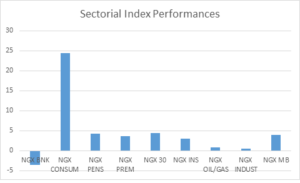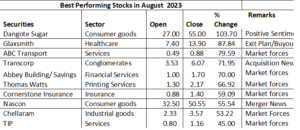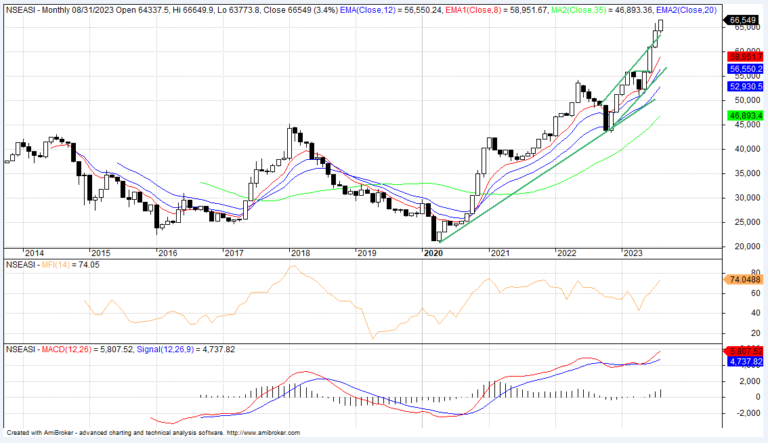Market Roundup for August
Nigeria’s stock market in August extended its uptrend and bullish run for the fourth successive month, hitting an all-time high of 66,548.99 basis points after testing 66,649.93 points on August 30, 2023 on the back of supportive market reforms by the new government which boosted investors’ confidence in the midst of the increasing macroeconomic headwinds.
This is the new peak of the index since 1996 when official data began, following the statement of President Bola Tinubu in his inaugural speech on May 29, 2023, when he announced removal of subsidy on petrol, after which there was exchange rate unification by the Central bank, among others that supported the market. Also, there was the effect of additional shares listed in favour of companies like MTN Nigeria, and Fidelity Bank, as well as price appreciation among highly priced stocks on the exchange during the period. There were also the recent buying interests in Consumer Goods, Conglomerates, and Insurance stocks.
The positive sentiment for BUA Foods and merger news among Dangote Sugar, Nascon and Dangote Rice continues to drive buying traffic to those companies. These supported the NGX despite the changing market conditions and trading environment due to macroeconomic headwinds, mixed corporate earnings and the prevailing yield in alternative markets or windows with rates and yields outlook remaining mixed due to rising inflation, interest and exchange rates, while not forgetting high volatility in the exchange market.
During the period, the following companies: Flour Mills Nigeria, Honeywell Flour and Stanbic IBTC Holdings released audited account for full and half-year respectively, while Cutix and other insurance firms presented unaudited quarterly results. Four first-tier banks also notified the exchange and investing public of delays in publishing their results, following which they now have September end as new deadline, while awaiting approval of the industry’s primary regulator.
Meanwhile, the month of September, being the concluding part of third quarter, will not only witness mixed trend as a result of new positioning towards the Q3 numbers expectedly, but experience reactions to earnings from few listed equities yet to release their half-year numbers, especially the interim dividend paying banks. Also the corporate actions in the new month will influence the expected mixed outlook for the period, even when the month is a positive one for equity market, going by historical data.
We note the weak macroeconomic indices and increasing cases of insecurity in the nation, inconsistent policies and global geopolitical tension in midst of rising inflation and rate hikes are stoking the fear of economic recession across the globe, thereby affecting demand for crude oil. The happenings in the economy and political space are likely to impact the market and different sectors positively or negatively, judging by the recently released Q2 GDP numbers showing a slow growth of 2.51%. This should also guide investment decisions ahead of quarter and year-end, especially tge knowledge of the sectors or industries that supported this marginal GDP growth.
Also noteworthy is the nation’s rising inflation rate which peaked at 24.08%, the highest since 2015, while Nigeria’s Purchasing Managers’ Index (PMI) fell to 51.7 points, from 53.2points in June, added to the back-to-back interest rate hike by the CBN, in the face galloping high cost of production and living. Selloffs and buying interest also remained mixed during the period. The volatile mode and high yield in fixed income market continue to affect the market, due to the exchange market hiccup in the country.
We expect that effective coordination among the policy makers will reduce policy mismatch, summersaults and promote realistic economic reforms, structural adjustments, effective disbursement of capital project funds and real change in the implementation style of the government necessary to further support the seeming economic recovery by enhancing productivity and national output needed to support growth in a new path of progress.
The bull-run during the month of August was obvious in the 23 trading sessions of the month, as the market closed positively in 14 days, recording decline in just nine sessions to extend the previous month’s positive outlook. It also increased the year-to-date gain, as NGX’s All-Share Index was up by 3.44%, owing to price appreciation, high traded volume and investors position taking. Despite the mixed earnings, many stocks remain attractive, offering high margins of safety and upside potentials.
Meanwhile, during the month under review, the key performance NGX All-Share index gained 2,211.47 basis points, closing at 66,548.99 basis points, after touching a high of 66,649.93bps and lows of 63,773.76bps, from the 64,337.52bps it opened for the month, representing a 3.44% growth. This came with buying interests in high, medium and low priced stocks, that supported the oscillation witnessed during the month.
The buying volume of total transactions for the month was 94%, while selling position was 4%, while volume index for the period was 1.32. Market capitalisation for the month gain N1.21 tillion, closing at N36.42 trillion, from an opening value of N35.01 trillion, representing a 3.46% appreciation in value. This is higher than the index due to additional shares listed during the period.
The market sustained buying sentiments and trends for stocks, especially with the stronger earnings, positive news, oscillating oil prices, expectation of interim dividend and investors going with value and defensive stocks that have strong yields to hedge against high inflation in the midst of a stronger US$ and depreciation of the Naira against other currencies.
Traded volume for the month fell by 59.85% to 9.15bn shares, from 22.79bn units in the month July, even as market breadth for the period was negative with decliners outnumbering advancers in the ratio of 58:52. This did not reflect on sectorial indices that closed bullish in the period under review.
Sectoral performance indexes for the period were bullish, as shown in the chart below; the NGX Consumer goods led the advancers, after gaining 24.51%. This was followed by the Growth index, Pension, NGX 30, Premium , Insurance, Oil and Industrial goods index with 4.95% 4.34%, 4.48%, 4.34% , 3.08%, 0.91% and 0.89% respectively, as investors took more position in Consumer goods and others, while Banking index closed lower by 3.57%.

The best performing stocks during the month were medium cap companies and low priced stocks, led Dangote Sugar which gaining 103.70% on merger news and positive sentiment, followed by GSK’s 87.84% notch on proposed exiting Nigeria and settling investors. Others were ABC Transport 79.59%; Transcop, 71.95%; Abbey Building, 70%; Thomas WY, 66.92%, Cornerstone Insurance 59.09%, Nascon 55.56%, Chellarms 53.22%; and TIP, 45%, among others.
Best Performing Stocks in August 2023

Source: Investdata Research
The worst performing stocks on the other hand, were Eterna, which share price witnessed selloffs and profit taking in the midst of its unimpressive Q2 numbers. Next was John Holt that had suffered loss on the exchange due to weak Q2 numbers and selloffs, others that topped the losers chart are Sovereign Trust Insurance, McNichols , Jaiz Bank, RT Briscoe, Fidelity Bank, Deap Capital, Daar Commination and Mutual Benefits.
Worst Performing Stocks in August 2023

Technical Analysis of August market
NGXASI MONTHLY TIME FRAME (Opening chart)
Speculative traders and bargain hunting have helped the market to breakout its 2008 resistance level after trending at its higher highs as revealed by daily, weekly and monthly time frame, with money flow index moving up but players trade with caution to avoid a bull trap. Since the NGX composite index has formed ascending chart pattern on monthly chart. On week time frame, clearly signaled recovery and retracement in the new month.
The ascending triangle chart pattern on the multiple time frame of weekly and monthly supports continuation of current trend or reversal depending on market forces and news, now that more interim dividend results are expected and others economic data. As oil price continued to oscillates around $82 to $86 in the international market, also the government planning to borrow less and reduce the high interest rate in the face of high cost of servicing debt.
Investors and traders should stay very cautious with their investments throughout the end of 2023 and beyond, by having good entry and exit strategies at all time.
Market Outlook
We expect mixed trend to continue until interim dividend paying banks like GTCO, UBA, Zenith Bank and Accesscorp start presenting their results, as Stanbic IBTC released its impressive numbers, offering N1.50 interim dividends, which has given market players insight into what should be expected at the end of the year.
The mixed intraday movement is likely to persist as the month of September progresses in the midst of profit booking and investors repositioning their portfolios ahead of Q3 numbers. This is also against the backdrop of the fact that the capital wave in the financial market may resurface in the midst of high-interest rate and yields in the fixed income market, high inflation and weak economic recovery and outlook for 2022 as government and its economic managers are going front and back with mismatch polices and action here and there. Coupled rising insecurity and high cost of doing business in the country.
Also, investors and traders are positioning amidst the changing sentiments in the hope of improved liquidity as a result of political activities and positive economic indices to continue and support the reversal of the current correction.
We see investors focusing on portfolio adjustment and rebalancing by targeting companies with strong potentials to grow their dividend on the strength of their earnings capacity.
Again, the current undervalue state of the market offers investors opportunities to position for the short, medium and long-term, which is why investors should target fundamentally sound, and dividend-paying stocks for possible capital appreciation for the rest of the year.
However, recovery may continue, depending on market forces, going forward, as propelled by expected Q3 earnings reports, until the next MPC meeting next.
Ambrose Omordion
CRO|Investdata Consulting Ltd
info@investdata.com.ng
ambrose.o@investdataonline.com
ambroseconsultants@yahoo.com
Tel: 08028164085, 08179547605








